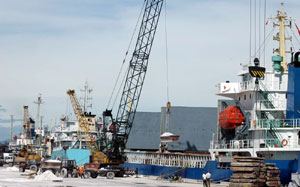Decentralisation Process Flags

The report, which focuses on eight cities and provinces including Ha Noi, HCM City, Hai Phong and Kon Tum, reveals that improperly controlled decent-ralisation has caused an imbalance between industries' growth and energy supply and brought about serious damage to the environment.
Before 2003, only the Government and central level could approve State budget-funded projects. From 2003-06, the scale and characteristics of projects determined what level was authorised to approve them. In 2006, ministries and ministerial-level agencies and localities were permitted to approve a majority of projects.
However, in many cases, ministries and localities have had to rely on the Government for funding, causing many approved projects to fall short on funds and forcing localities to compete for the limited funds from the State budget, according to the report.
In many provinces nationwide, localities all vie for the same industries, such as sea transport and mine exploration, creating tougher competition and reducing national competitiveness in international integration, said VIE senior economist Vu Tuan Anh, a member of the report compiling board.
In Viet Nam, Anh said, decentralised models were applied both prior to and during the integration process in order to give localities flexibility and reduce administrative bureaucracy, especially in more complicated socio-economic activities.
However, so far, decentralisation had not been properly linked to economic integration, he said. Both national and local socio-economic development plans lacked clear objectives and forecasts about how economic integration would impact their economies.
Director of Viet Nam Institute of Economics Tran Dinh Thien said that decentralisation was a major part of restructuring the country's economy, as it related to practically every sector.
And while economic integration had many potential benefits, it was necessary to have suitable mechanisms in place in order to realise those benefits.
Besides assessing the situation of socio-economic planning and economic integration, the study also addressed foreign direct investment attraction and management, public investment and public infrastructure/services development, land management and regional co-operation.
The report is part of the Beyond WTO Programme, developed in response to a request from the Vietnamese Government for donor support to help with managing economic integration and the transition to a market economy in the period after Viet Nam's accession to the World Trade Organisation. It was funded by the Australian Agency for International Development and the UK Department for International Development. — VNS
Indian Food Delivery Unicorn Zomato Likely To File For IPO Next Month
Food delivery unicorn Zomato is planning to file for an Initial Public Offering (IPO) by April which could raise $65... Read more
Vietnams Bamboo Airways Aims Third-quarter Listing With Market Cap Of $2.73b
Vietnam’s startup Bamboo Airways said on Friday it aimed to list its shares on a local stock exchange in the thi... Read more
Didi Chuxing Advances IPO Plans To Next Quarter, Targets $62b Valuation
Chinese ride-hailing giant Didi Chuxing Technology Co. is accelerating plans for an initial public offering to as early... Read more
Warburg-backed Kalyan Jewellers IPO Loses Shine, Sees Tepid Demand
Kalyan Jewellers India Ltd’s initial public offering was oversubscribed by just 1.28 times on Thursday, a sign of tep... Read more
Chinese E-commerce Platform DMall Hires Banks For Over $500m US IPO
Chinese e-commerce platform Dmall (Beijing) E-commerce Co has hired Bank of America, Goldman Sachs and JPMorgan for a... Read more
Tencent-backed Chinese Software Firm Tuya Eyes $915m In US IPO
Tuya Inc., a software company backed by New Enterprise Associates and Tencent Holdings Ltd., is on track to raise $915 ... Read more


